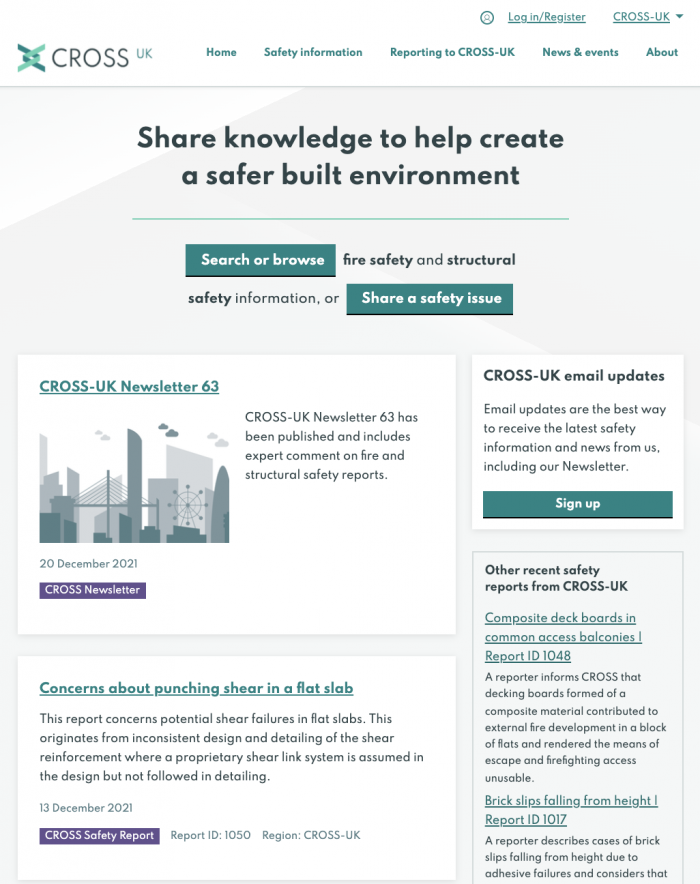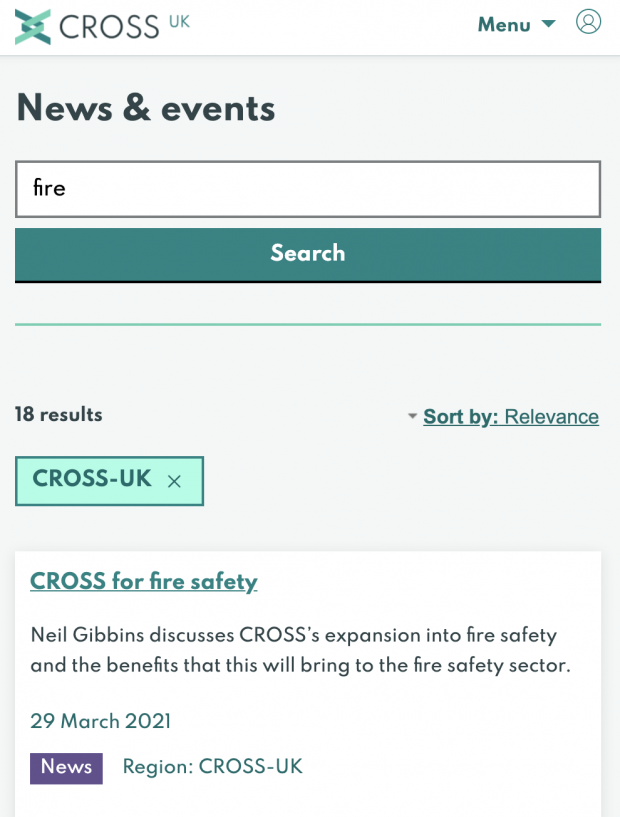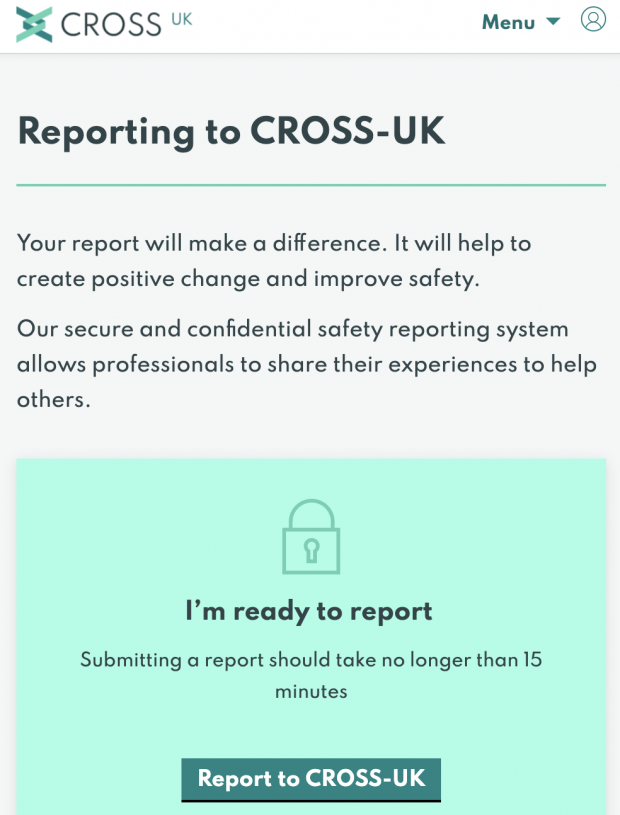 Support for Drupal 7 is ending on 5 January 2025—it’s time to migrate to Drupal 10! Learn about the many benefits of Drupal 10 and find migration tools in our resource center.
Support for Drupal 7 is ending on 5 January 2025—it’s time to migrate to Drupal 10! Learn about the many benefits of Drupal 10 and find migration tools in our resource center.CROSS (Collaborative Reporting for Safer Structures) is an acknowledged independent source of expertise for gathering and sharing information on structural safety issues to help create a safer built environment.
Since 2005, CROSS has operated a voluntary confidential safety reporting system to capture and share lessons learned from structural safety issues which might not otherwise get public recognition. The audience is those involved in the design, construction and management of structures. The aim is to identify pre-cursors which could result in structural failure in similar circumstances if not addressed.
CROSS also publish safety alerts to raise awareness of safety risks identified and to disseminate lessons learned from structural safety concerns and incidents. These safety alerts can be related to CROSS safety reports, or they can be related to safety issues which are already in the public domain.
The CROSS website first went live in 2008, followed by an updated version in 2013. Following the Grenfell Tower tragedy in 2017, Dame Judith Hackitt undertook an Independent Review of Building Regulations and Fire Safety. The final report recommended that CROSS “should be extended and strengthened to cover all engineering safety concerns”.
CROSS is operated jointly by the Institutions of Civil and Structural Engineers and with the launch of the new website, has expanded its remit to include reporting on fire and structural safety.
The redevelopment of the website included two important components:
- The public facing website
- The Safety Report Management System (SRMS)

CROSS wanted to create an accessible web experience that enhances the audience’s engagement with CROSS while building a secure, responsive, robust, scalable, easy to upgrade and cost-effective infrastructure.
With a preference for Open Source, CROSS investigated various CMS options and implementation partners before selecting Drupal as the platform and Zoocha as the partner.
Whilst the legacy CROSS website accepted reports on structural safety issues, the aim of the new extended and strengthened website was to also accept reports on fire safety issues, adding to the existing collection of reports on structural safety issues.
Another key aim of the project was to greatly broaden the demographic of CROSS’s audience. CROSS has historically had a strongly engaged audience in the structural engineering community and amongst parts of the contracting sector, local authority building control, and others in the construction industry. CROSS wanted to broaden the demographic of their audience across the design, construction and building management sectors.
Before starting on the redesign and redevelopment project, CROSS commissioned a discovery research project to understand how the CROSS service can be expanded in a way that makes it simple and easy for people to share information and learn from each other. This discovery research undertook user research with people from current and potential future audiences of the CROSS website.
The discovery and alpha (design) phase of the project was undertaken by Mace & Menter.
Speaking ahead of the launch, Dame Judith Hackitt said:
This is a really important step in changing the culture around buildings and structures to one of openness and transparency. Other industry sectors like airlines have shown how valuable this type of no-blame reporting of concerns can be in identifying potential causes of failure before they happen and ensuring that they are shared with the whole sector.
Building Safety Minister, Lord Greenhalgh, said:
The expansion and strengthening of CROSS is a major step towards implementation of the new building safety regime, providing those in industry with the tools and information needed to effectively share valuable lessons learned and promote best practices.
Complementing other reporting systems, the relaunch of CROSS will play a key role in fostering a more open culture towards reporting and safety across all buildings.
Technical specifications
Domain Access, Domain Access Entity & Domain Country Path
The CROSS website has regional variations for the UK, US and AUS. The domain module allowed us to restrict editing of content to regional editors whilst also allowing it to be viewed from any region. This was important to allow users to expand their searches to all regions, where information might not yet exist for their region.
The terminology used in different regions can vary so using the Domain Entity module we could expand the functionality to taxonomy terms to meet this need, and expose the relevant terms to users when reporting issues.
Metatag & Schema.org Metatag
We were provided with the desired schema output from an SEO agency and the Schema.org Metatag module provided us with a solid basis to implement and extend to achieve the exact requirements.
Facets, Search API, Search API Solr & Search API Autocomplete
The site search uses Search API together with solr to provide extensive and fast search functionality. Content is organised into various categories and tagged with relevant building/safety area/type terms. Exposing these using facets allows the user to easily drill down and find exactly what they need.
The CROSS team needed to be able to manage synonyms themselves, so these are managed directly on the terms and then fed into the index. Phonetic searching was also very important and for this we were able to use out-the-box solr functionality.
Search API Autocomplete’s hooks enabled us to expose key information immediately (for example the Report ID where relevant) and inject suggestions.
Webform
The Webform module is key to the SRMS. Reporters submit information to CROSS in a multistep, conditional form. We were able to build the basis of the ‘Report to CROSS’ form using the extensive functionality of the Webform module, and could then easily alter the form to our specific needs. These submissions then form the basis of the report node content.
Paragraph
CROSS wanted to be able to build up content using re-usable components. The paragraph module was the perfect choice for this as it allowed compartmentalisation of common groups of fields whilst also allowing customizability to build bespoke components.
Domain Access: https://www.drupal.org/node/3184586 (Committed)
Domain Country Path: https://www.drupal.org/node/3204597
Domain Role: https://www.drupal.org/node/3203097
All new patches contributed

